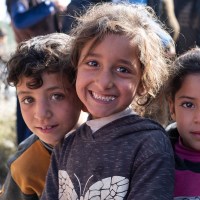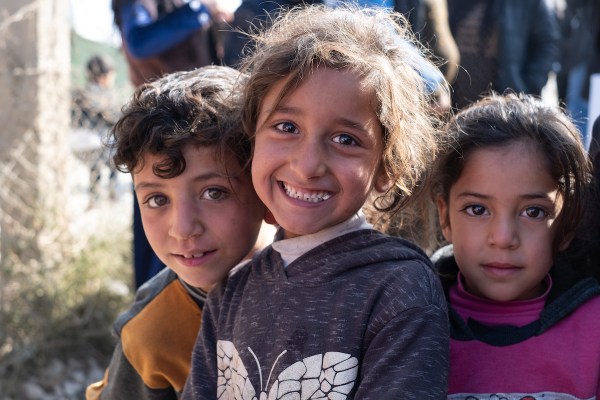Without a classroom to attend, these kids would be working long days on farms. Photo by Erin Wilson / Preemptive Love
Sammy psyched himself up for another day in the field. In the ten years he had been living in Lebanon, he had never thought about visiting the Beirut neighborhood of Nabaa because it had a reputation for violence. “My friends warned me it was where all the thieves, terrorists, and drug dealers lived, and I should stay away.” What Sammy found surprised him.
According to the World Bank, Lebanon is one of the top three global financial and economic crises since the mid-1800s. Its currency has lost 90% of its value, and 80% of Lebanese live below the poverty line. What this means for everyday life is families are hungry. UNICEF reports that 77% of Lebanese families cannot buy enough food and 99% of Syrian refugee families in Lebanon cannot buy enough food. Nearly half of all households do not have enough drinking water.
Beirut, especially, is suffering. In addition to the economic crisis, the 2020 explosion in the Port of Beirut, the largest port in Lebanon, damaged 77,000 apartments and displaced 300,000 people, including over 80,000 children who were left homeless. For a country that imports 85% of its food and much of its energy, the destruction of its largest port was catastrophic for its citizens.
Sammy went to Nabaa–an area of Beirut where many refugees from Syria have settled–to assess homes for repair after this community of peacemakers responded overwhelmingly to help families who lost their homes in the port blast. What Sammy found in this particular neighborhood was vulnerable people in desperate need, but he couldn’t help them. Because their home repair needs stemmed from poverty and not the port blast, they didn’t qualify for this project. Sammy was frustrated. “We hated having to see so many vulnerable people and telling them, ‘No, we can’t help you.’ Both Lebanese and Syrian [refugees]. Seeing single mothers raising 9 kids on her own, having to send them to beg just to live, seeing countless children having to work as day laborers, trash pickers, or beggars, and not being able to do anything to help. We would ask why they weren’t in school. Their reply was universal because they couldn’t eat if they didn’t work. And they haunted our thoughts. It’s true they didn’t fit our project, but they desperately needed help, and the thing they all asked for was food.”
Sammy found a much more profound problem than homes needing renovations—he discovered, inside a neighborhood suffering from hunger, a generation of children–refugees from Syria–having to work so their families can eat. A generation of children goes without an education so their families can survive.
And together, we are responding!
The premise is simple: children who used to beg for food, pick trash, or work as day laborers attend an intensive literacy center, so they can get caught up on the basics of reading and math. They receive a meal and some fruit when they attend class so they have the nutrition they need to learn. Parents receive a monthly food basket to ease their burdens, so the entire family gets to eat because their children attend the literacy center. And because the local community is also desperate, some of the most vulnerable families in the neighborhood get food baskets too—easing tension between the local and refugee communities.
For Sammy, this is “the most fulfilling project I’ve ever had the pleasure of working on, being able to help those people we had to say no to.”
Situations in Syrian refugee camps in Lebanon’s rural Beqaa Valley are even direr. In families with two parents (70% of families are female-headed households) who could work, they earned less than a dollar a day combined. From their wages, refugees have to pay for rent for their tents, food, subscription fees to the settlement’s generator to have electricity, water, and gas to cook. Sammy reported that many Syrian families hadn’t eaten breakfast in years–since before having to flee Syria–because they can’t afford it. He said, “It’s the women and children who have to work in the fields or in the forests just to pay rent for their tent. Same story as in Nabaa, the children simply cannot attend school because they cannot afford to.”
Even more heartbreaking are the children who work on Lebanese farms collecting the current harvest and who earn 60 cents per day. Refugee children here aren’t allowed to attend local schools, so they help their families by working in the fields. Children in the refugee camp reported that they are beaten while collecting a potato harvest on a Lebanese farm if they worked too slowly, or are burned if they try to take a potato home to share with their family.
Just as we have the chance to stand with kids in the city, we can stand with kids in rural refugee camps too. Together as a community of peacemakers, we can help kids get an education at literacy centers in the refugee camps while providing food baskets for their families. We can keep children away from brutal workloads and abuse suffered on farms, and allow their whole family to eat.
Before providing food boxes for students’ families, classrooms were half empty. Now, all classes are packed, students attend regularly, eager to learn and to eat. More students are on a waiting list until a classroom becomes available. Beyond this camp, thousands of children are desperate for this kind of opportunity.
All over Lebanon, kids have lost their childhoods to the disruptions of violence. Learn more about the situation in Lebanon and how our work is helping children be children for a little while longer.


